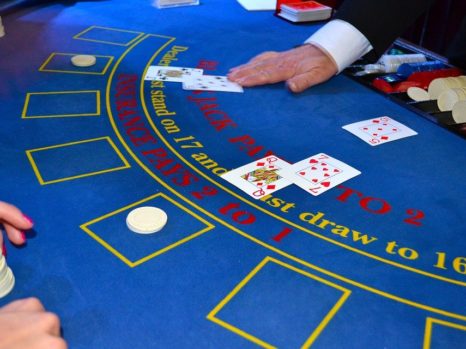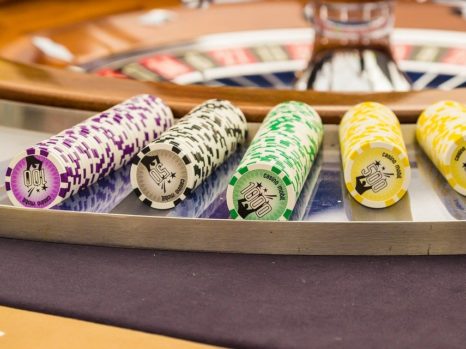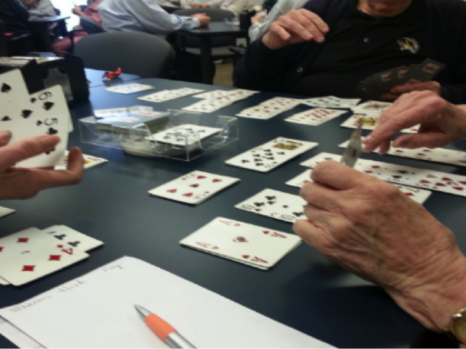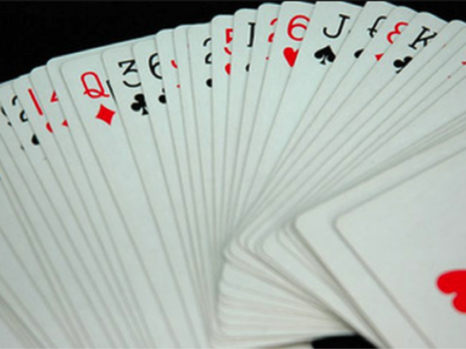Human beings are very much prone to developing addictions. The main reason for this is that we lead stressful lives and we tend to grow attached to actions that make us feel better. If we find a pleasurable activity, we tend to repeat it in a compulsory manner, trying to force our brains to release oxytocin again and again and again. We do this with food, people, pets, TV shows, most hobbies. And card games fit right in this category. The difference between a way to unwind and an addiction lies with they way in which we come to consume and addiction, whereas we savor a real pleasure.
5 PSYCHOLOGICAL REASONS PEOPLE DEVELOP CARD GAME ADDICTIONS

Playing cards
1. The winning hype and the winning streak
Imagine looking for a good time in a friendly game of cards with friends. Then imagine winning. This sounds nice for anyone, let alone for a person who is dissatisfied with his life and for whom a win is quite a change from the day to day activities. People start to chase this feeling and to leave everything behind for it. For some it is mostly about the money earned in these games, while for others it is the mere recognition of themselves as winners.
Then there is a winning streak. This phenomenon is perplexing to say the least. It can get the people who like to play card games just for fun all excited. But a person who is already slightly addicted, will likely read too much into it. They will think that the winning streak is due to the consistent effort put up to that moment in playing, to developing their skills or they simply assume that their luck is changing, and they need to take advantage of it. The thing about a winning streak is that it will end at some point.
On one hand, you never know how long the winning streak is going to be, so you keep playing, hoping you are still in it. Normal people will feel a mild disappointment when the winning streak ends, because they will not have gambled too much. An addict, however, who feels the impulse of increasing the stakes and risk losing more with every game played, will not react the same way. At one point, losing everything becomes possible.
2. The apparent reliability of card game rules
Most people who develop addictions are dissatisfied with the way the world works. Most often, these are people who have done everything right, and who were not compensated accordingly. The best example is the promise of a good job and of a secure life after college. As many people know from experience, playing all the cards right in real life does not always result in a win.
By comparison, card games, with their simple, yet strict rules, are easier to understand and to follow. And when they play a game whose winning is mainly attributed to skills instead of getting a good hand, they finally feel that compensation which is missing from their lives. Win or lose, they will play the game because it makes sense, because it is a way to escape.
3. Easy to learn, tough to master – an issue of pride

Playing cards
Most card games are easy to learn. They are not like board games with different rules for different elements, exceptions and special situations. Anyone who has ever tried to play Risk can tell you how long it can take you to understand the game, let alone to master it. So, while anyone can try their hand at playing the game, mastering it is a whole different story. As you might expect, you don’t always get to play at the same table with people who are just as invested in the game as you are. Some may care less about winning, while others do it only to pass the time. Winning can make you feel like the best player there is and it becomes an issue of pride. Problems arise when you play against people who have truly mastered the game.
4. Finally beating the odds
Another way of looking at a game of cards is finally beating the odds. While we see winning at cards as being something owed completely to skill and whit, others see it as a game of chance alone. It also depends on the game they choose. Winning at a game of chance feels like you are finally beating the odds. The feeling is just as necessary to anyone from time to time, but some people develop an unhealthy addiction to the excitement and need to win again and again, only to confirm some sort of supremacy over life and its unpredictability.
These are moments when Lady Luck becomes a very real character and this game of chance becomes more personal than it should.
5. With a little help from our Casino friends
Addictions, as dangerous as they may be, are supported by the Casino industry. And we are not only talking about the traditional casinos, with the buildings and the tables, and the hostesses. We are also referring to the online casinos, that keep reeling people in by doubling their bonuses, keeping them playing. The online experience can sometimes be almost just as exciting as the real thing!

Casino interior
Otherwise, real casinos are welcoming. The experience is glamorous, and you like it when you are made the center of attention. However, as part of the Casino policy, you should know that the more you win, the less chances you have of leaving with the money. Some casino tricks include offering the winners a suite, to keep them overnight, offering them complementary breakfasts and other treats to keep the winners on location, all in order to make sure they are there the following night, where they can lose the money back. The House always wins!
The same goes for online casinos. You win a little, you lose a little more. While from behind the screen people are more careful with their money, as there is no physical pressure to live up to expectations or to impress others on the floor, they are still tricked into leaving some money behind.













